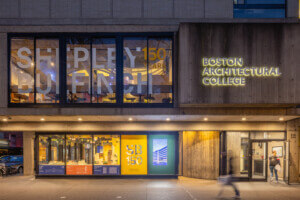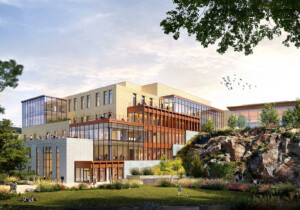On June 1, a few dozen Cambridge, Massachusetts, officials, business leaders, and other key figures in the area gathered around a breakfast spread in Parsnip, a tony neighborhood restaurant owned by the billionaire investor Gerald Chan. They were there to glimpse a long-awaited plan for another one of Chan’s properties, the long-vacant Harvard Square Theater at 10 Church Street. Anthony Galluccio, Chan’s attorney and the former mayor of Cambridge, unveiled a bold proposal to knock down the 82-year-old cinema and replace it with a 60,000-square-foot mixed-use building with two theaters below-grade, street-level retail, and five stories of office space.
Two renderings released to the public show a light-filled atrium enclosed by glass and visible from the street through a gap in the facade, which is composed of alternating bands of glass and textured cork-and-cement panels rising out like classical pilasters. The design, by architects Paulo Martins Barata and Luís Teixeira of the Portuguese firm Promontorio and Elizabeth Whittaker of Boston-based Merge Architects, “will be contemporary in its presence and identity, while remaining culturally respectful of the overall architectural language throughout Harvard Square,” according to a statement from Whittaker.
Chan’s plans for the cinema building were well-received, staking out a rare bit of common ground in the long-running and increasingly heated debate over the future of Harvard Square. The cinema is the latest and perhaps most striking change in a flurry of new development that will transform Harvard Square for good—and, some local activists fear, for the worse.
Although the cinema building dates to 1925, preservationists did not object to calls for its demolition. Charles Sullivan, executive director of the Cambridge Historical Commission, described it as a “big brick box” interrupting the flow of Church Street.
Not all the changes to the neighborhood, however, are being welcomed quite so warmly. Take the block enclosed by Brattle, Mt. Auburn, and John F. Kennedy Streets, for example. Developer Regency Centers owns three adjacent buildings on the site, and has plans to replace one with a new five-story structure. In addition to restoring the historic facade of the neighboring flatiron Abbott building, Regency would widen the retail footprint on site, replacing the “World’s Only Curious George Store” with a concourse and escalator at the head of the building’s prominent frontage onto Harvard Square.
Some worry the overhaul will amount to a glorified mall, attracting chain stores instead of locally owned businesses and turning the site’s back on the center of the square.
“This has been a longstanding issue in Harvard Square,” said Charles Sullivan of the Cambridge Historical Commission. As a practical matter, however, Sullivan said Regency is not calling for a mall, because all of the building’s stores would open onto the street, not an enclosed concourse. City officials are in discussions with the developer about how many stores would be allowed in the new building; current proposals range from five to nine.
Perhaps the most contentious property in Harvard Square is also its smallest. After three decades as an eclectic newsstand, a former subway-station headhouse at the heart of the square has become a stand-in for a broader debate about the character of the neighborhood. The Harvard Square Subway Kiosk was added to the National Register of Historic Places in 1978, but its future remains unclear.
A $4.6 million renovation plan for the square initially called for the kiosk’s demolition, but last year Cambridge City Council launched a study to landmark the building in response to public outcry. A city-appointed committee evaluating options for the kiosk’s future had its first meeting in May.
Denise Jillson, executive director of the Harvard Square Business Association, would like to see the kiosk become a permanent showcase for area businesses, featuring wares from a rotating cast of small businesses in the neighborhood. That would mean the end of Out of Town News, the 500-square-foot kiosk’s current tenant, which Jillson derides as a purveyor of tobacco, lottery tickets, and pornography.
About 15 years ago, development in Harvard Square settled into a relative lull, said Sullivan. With several high-profile projects underway today, however, tensions run high once again.
“As real estate development waxes and wanes, the temperature of the discussion changes accordingly,” said Sullivan. “There probably have been dozens of watershed moments in the history of the Square. It’s always evolved.”










